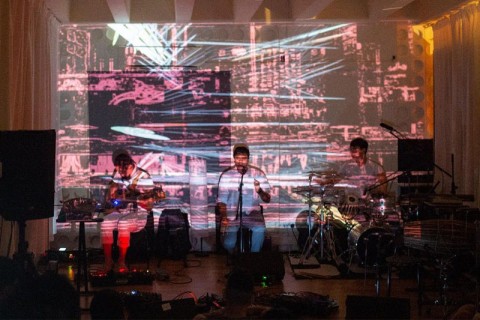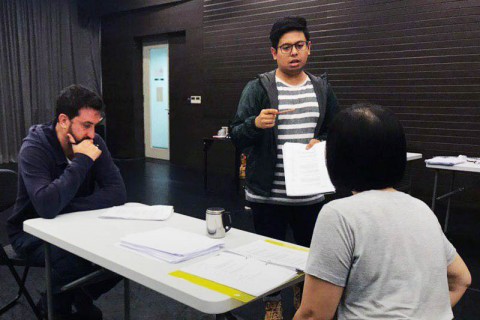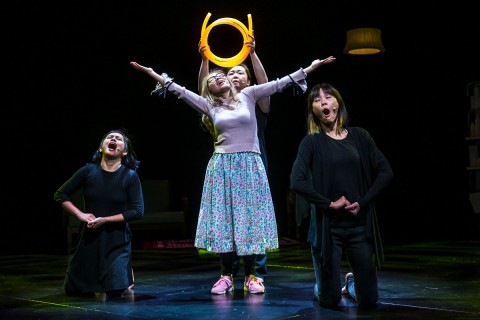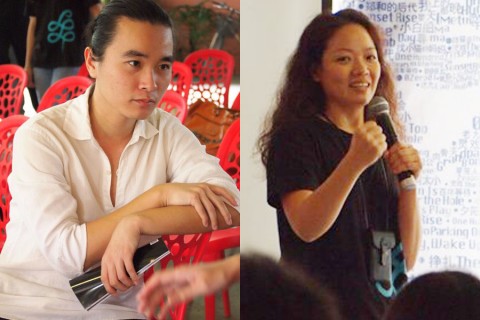SAtheCollective presents their 3rd installment of ETHNI-CITY. ETHNI-CITY is a collaborative project between SA and artists from different ethnic backgrounds. At its core, the project aims to find new ways to assimilate one another's cultures and to celebrate the meeting of diverse cultures.
We first heard SA the original trio play in 2014 at the Patron of the Arts Awards. Most recently, we caught a rare solo Andy Chia (one of the trio) playing the Chinese flute in Southernmost: One Table Two Chairs Project 2018 - Phase 1 as accompaniment to Kanji Shimizu's Noh showcase. At the end of the showcase, we were treated to a delightful spontaneous improvisation by both of them.
Given our little but fortuitous encounters with SAtheCollective, we are highly anticipating the Collective's upcoming transcultural collaborative product, Kali Yuga. We speak to Andy and Natalie about the Collective's prospects and the essence of Kali Yuga.


1. SAtheCollective seems to be undergoing a sort of transformation: from a trio strongly associated with ‘Chinese music’ and ‘Chinese ancestry’ to a collaborative organisation focusing on interdisciplinary and multicultural practices. Could you share with us the
(a) inspiration and motivation behind these changes, and
(b) the challenges you face?
(a) Being a trio, or a group looked upon as a 'band' was not enough to fulfil our artistic visions, neither was it sustainable from the point of view of an 'industry player', with limited prospects for artistic expansion or development. Some of the initial questions we asked ourselves were, 'Are we going to tour forever?', 'Are we going to be paying to travel and depend on door and drinks sales to survive?', 'Do we always have to call in favours to make a show go well?', 'How do we pay ourselves, our artistic collaborators, audio engineers, lighting designers?'. It was a question of survival, and also how do we contribute to the ecosystem - to give back and not just take from it?
Artistically, there were many other sensorial impetus that we wanted to explore. While the collective is still based on and grounded in Sound and Sonic inquiries, the team wanted to explore multi-modal presentational styles. This was also based on the group's long-standing search for responding and understanding events and happenings around the world with knowledge sensed rather than learnt. In sensing, we don't just want to appeal to our ears, but also our sense of touch and sight for example. We want to create experiences, not just play gigs at underground venues.Thus the move towards an arts company that is diverse in disciplines. The group has also always been multicultural musically. We had always explored different genres of music in our works. We may have been classically trained in Chinese music, but always had a Southeast Asian sensibility in our sonic presentations. With the company, we have also incorporated Associate Artists of diverse origins and cultures, expanding our instrumentation.
(b) As with the survival of most arts companies, the organisation's business/financial plans are always challenging. We are first and foremost artists, we have limited knowledge of how to run an organisation. We have limited knowledge of fundraising, holding fundraisers; we do not know strategies to attract the right patrons and funders. We are a young arts company. We may not have the capabilities to hire nor train arts administrators... Most of the challenges are really nothing to do with art-making. We struggle with making ends meet, and finding our place in the industry.

2. The terms ‘multicultural’, ‘intercultural’, ‘transcultural’ are surfacing more frequently in recent years to describe the relationships between cultures. What does the Collective think about the differences in their meanings? Which of these terms best describes SAtheCollective and ETHNI-CITY?
We refer to Schippers (2010) when he speaks about cultural diversity in music education. We thought his definitions were easy to understand:
'Multicultural' - different cultures existing together.
'Intercultural' - different cultures not only existing, but interacting with one another.
'Transcultural' - when different cultures interact with one another, gain an understanding of one another, and incorporate aspects of others' culture seamlessly into one's own.
ETHNI-CITY is primarily intercultural, with a vision to move towards transculturalism.


3. How is multi/inter/transculturalism interpreted and 'performed' in Kali Yuga? Is it achieved by using a combination of traditional and contemporary instruments, new ways of instrument-playing and/or attributed to the music composition?
The instrumentation is multicultural - the Chinese guzheng, dizi, Indian tabla, mridangum, carnatic vocals, Western bass, chapman stick; the musical influences are a mix of traditional, classical, jazz and experimental. There is also transcultural music-making where we transcend one another's cultures and boundaries, and work towards a single concept - that is the essence of Kali Yuga.


------
ETHNI-CITY III: Kali Yuga
by SAtheCollective
Date: 26 & 27 Oct 2018
Time: 26 Oct - 8:00pm / 27 Oct: 3:00pm, 8:00pm
Venue: LASALLE College of the Arts, Flexible Performance Space
Visit event page

 An Email Interview with/for/about Heather
An Email Interview with/for/about Heather
 Negotiating the Role of an Audio Describer - Interview with Timothy Nga for Not In My Lifetime?
Negotiating the Role of an Audio Describer - Interview with Timothy Nga for Not In My Lifetime?
 勒紧腰带看新的郭宝崑
勒紧腰带看新的郭宝崑